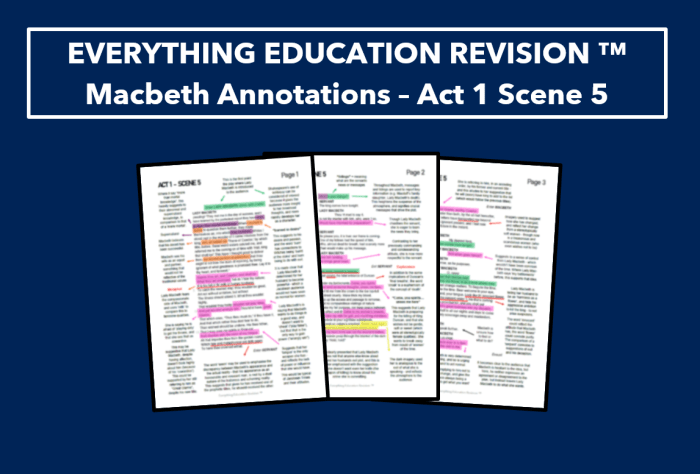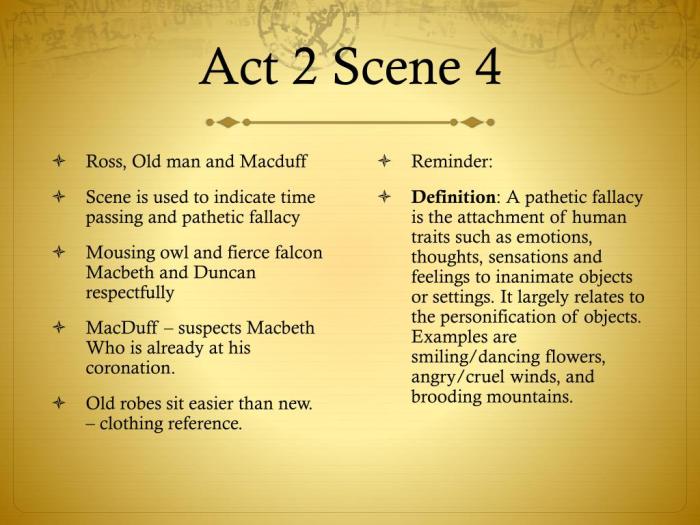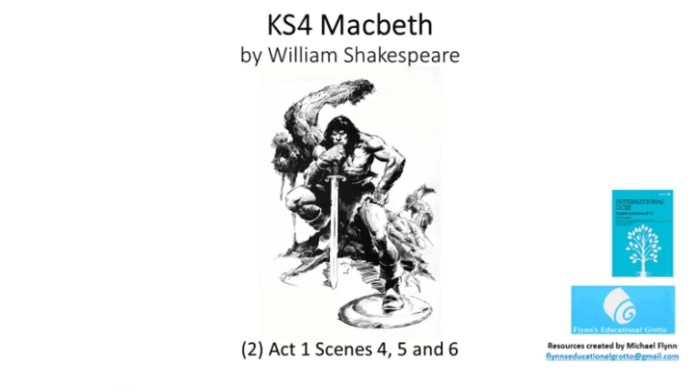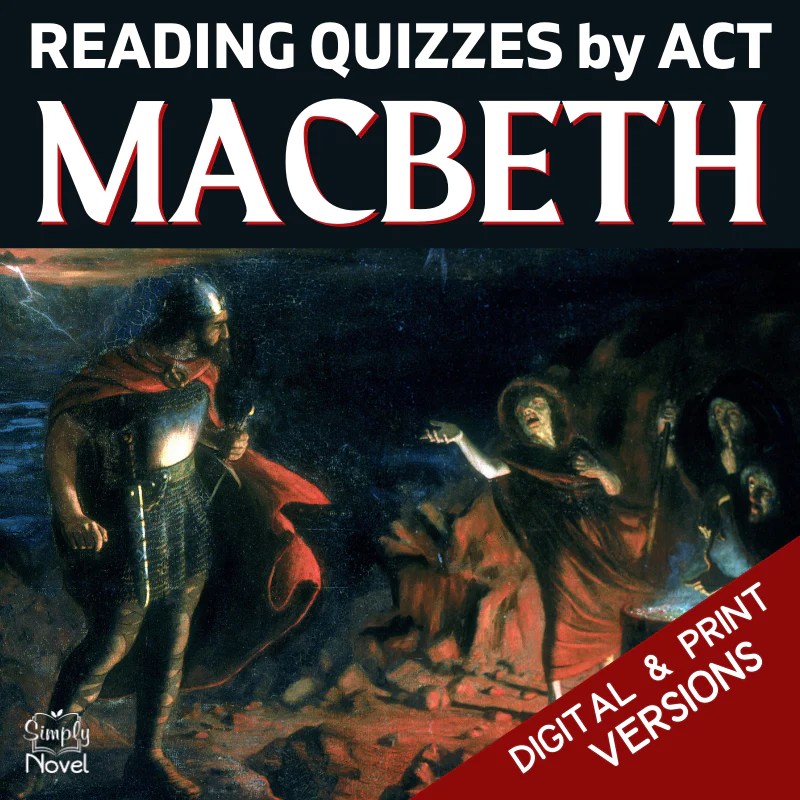Macbeth reading guide act 2 – Embark on a captivating journey with Macbeth Reading Guide: Act 2, where ambition and guilt intertwine amidst the ominous whispers of witches. Dive into the depths of Shakespeare’s masterpiece, exploring the complexities of human nature and the consequences of unchecked desires.
This comprehensive guide delves into Macbeth’s internal struggles, the manipulative influence of Lady Macbeth, and the pivotal role of the witches’ prophecies. Prepare to unravel the intricate tapestry of Act 2, uncovering its profound themes, literary devices, and character development.
Macbeth’s Internal Conflict
Act 2 of Macbeth explores the profound internal conflict that consumes Macbeth as he grapples with the consequences of his ambitious actions.
Macbeth’s ambition, fueled by the witches’ prophecies, drives him to murder Duncan. However, the act of regicide weighs heavily on his conscience, triggering feelings of guilt and remorse. This internal struggle manifests in his hallucinations, such as the appearance of Banquo’s ghost at the banquet, and his increasing isolation and paranoia.
Ambition and Guilt
Macbeth’s ambition is a double-edged sword. It provides him with the motivation to pursue power, but it also leads to his downfall. As he commits more heinous acts, his guilt intensifies, driving him into a state of madness and self-destruction.
- Duncan’s Murder:The murder of King Duncan is the catalyst for Macbeth’s internal conflict. The act of regicide violates the natural order and weighs heavily on Macbeth’s conscience.
- Hallucinations:Macbeth’s guilt manifests itself in hallucinations, such as the appearance of Banquo’s ghost. These visions represent the psychological torment that Macbeth is enduring.
- Isolation and Paranoia:Macbeth’s guilt and fear of retribution lead him to isolate himself from others. He becomes increasingly paranoid, suspecting treachery everywhere he turns.
Lady Macbeth’s Influence

Lady Macbeth plays a pivotal role in her husband’s decision to murder King Duncan. Her ambition and manipulative nature drive Macbeth towards the path of darkness.
Lady Macbeth’s Ambition
- Lady Macbeth is fiercely ambitious and desires power for herself and her husband.
- She believes that Macbeth has the potential to be king and manipulates him into taking action.
- Her ambition blinds her to the moral implications of their actions.
Lady Macbeth’s Manipulation
- Lady Macbeth is a skilled manipulator who uses flattery, guilt, and emotional blackmail to influence Macbeth.
- She plays on Macbeth’s insecurities and doubts to make him question his own masculinity and worthiness.
- She isolates Macbeth from his supporters and creates a sense of dependency on her.
The Role of the Witches

The witches’ prophecies in Act 2 play a pivotal role in shaping the play’s events and characters. Their predictions, both explicit and ambiguous, sow seeds of ambition and guilt in the minds of Macbeth and Lady Macbeth, ultimately driving their actions and shaping their tragic downfall.
Their Prophecies’ Influence
- Macbeth:The witches’ prophecy that Macbeth will become Thane of Cawdor and eventually King of Scotland awakens his dormant ambition. This prediction plants a seed of desire in his heart, which Lady Macbeth later nurtures into a full-blown obsession.
- Lady Macbeth:The witches’ prophecy that Banquo’s descendants will become kings fills Lady Macbeth with fear and jealousy. This fear motivates her to manipulate and pressure Macbeth into murdering Banquo, ensuring their own future.
The Use of Imagery
Act 2 of Macbeth is replete with vivid imagery that creates a palpable atmosphere and foreshadows the tragic events to come. The play’s language is rich in sensory details, evoking a sense of darkness, violence, and foreboding.
The imagery of blood is particularly prominent, foreshadowing the bloodshed that will follow. In Scene 2, Macbeth’s dagger appears as a “bloody” one, and he sees “blood” on his hands. These images foreshadow the murder of Duncan and the guilt that will haunt Macbeth.
The Macbeth Reading Guide for Act 2 provides an in-depth look at the play’s themes, characters, and symbolism. As we delve into the act, we’ll also explore the concept of “going home” as discussed by Joan Didion in her essay Joan Didion on Going Home . Didion’s insights on the complexities of returning to one’s roots resonate with Macbeth’s own struggles as he grapples with the consequences of his actions and the weight of his guilt.
The Reading Guide for Act 2 will guide us through this exploration, shedding light on the play’s enduring themes.
Darkness and Shadow
The play also employs imagery of darkness and shadow to create a sense of mystery and danger. The witches’ cave is described as “dark” and “foggy,” and the night of Duncan’s murder is “black” and “starless.” These images suggest that the events of the play are taking place in a realm of darkness and evil.
Animals and Nature
Imagery of animals and nature is also used to foreshadow events. The owl, a symbol of death, is heard hooting in the night, and the raven, a messenger of bad news, appears in the witches’ cave. These images suggest that the natural world is in tune with the evil that is taking place.
The use of imagery in Act 2 of Macbeth is essential to the play’s atmosphere and foreshadowing. The vivid sensory details create a palpable sense of darkness, violence, and foreboding, and they prepare the audience for the tragic events that are to come.
Symbolism and Motifs
Act 2 of Macbeth is rich in symbolism and motifs that contribute significantly to the play’s themes. These elements create a deeper layer of meaning and help convey the characters’ inner struggles and the play’s overall message.
One prominent symbol in Act 2 is the daggerthat Macbeth sees before him as he contemplates murdering Duncan. This dagger represents Macbeth’s ambition and the bloody path he is about to embark on. It is a physical manifestation of his inner turmoil and the choices he must make.
Blood
Blood is another important symbol in Act 2. It represents the guilt and violence that permeate the play. Macbeth’s hands become stained with Duncan’s blood after the murder, symbolizing the weight of his crime and the irreversible consequences of his actions.
Darkness and Light
The play also uses darkness and light as motifs to represent the moral conflict within Macbeth. The darkness symbolizes evil and corruption, while the light represents goodness and hope. Macbeth’s descent into darkness as he succumbs to his ambition is reflected in the increasingly dark and stormy atmosphere of the play.
Character Development

In Act 2 of Macbeth, the characters of Macbeth and Lady Macbeth undergo significant development as they grapple with the consequences of their actions.
Their interactions and actions reveal a shift in their motivations and personalities, leading to a deeper understanding of their characters.
Macbeth
- Initially driven by ambition and the witches’ prophecies, Macbeth becomes increasingly consumed by guilt and paranoia.
- His hallucinations of Banquo’s ghost and his violent outbursts demonstrate his mental instability and the toll the murder has taken on him.
Lady Macbeth
- Once a strong and ambitious woman, Lady Macbeth’s resolve begins to crumble under the weight of their crimes.
- She becomes increasingly isolated and haunted by nightmares, reflecting her growing guilt and remorse.
Themes and Ideas: Macbeth Reading Guide Act 2

Act 2 of Macbeth explores several major themes and ideas that shape the play’s narrative and character development.
Ambition and its Consequences
Macbeth’s ambition to become king drives the play’s events. This ambition is fueled by the witches’ prophecies and Lady Macbeth’s manipulation. However, Macbeth’s pursuit of power leads to his downfall, as he becomes increasingly ruthless and paranoid.
The Corrupting Influence of Evil
The witches represent the forces of evil in the play. They tempt Macbeth with promises of power and manipulate him into committing heinous acts. Their influence corrupts Macbeth’s soul, leading him down a path of darkness and destruction.
The Power of Guilt and Remorse
After murdering Duncan, Macbeth is haunted by guilt and remorse. These emotions manifest in hallucinations and visions, driving him to the brink of madness. Lady Macbeth, too, is unable to escape the consequences of her actions, as she descends into a state of sleepwalking and despair.
The Fragility of Masculinity
Macbeth’s masculinity is threatened by his wife’s strength and ambition. He feels the need to prove his worthiness by committing acts of violence and cruelty. This fragile masculinity ultimately contributes to his downfall.
The Role of Fate and Free Will
The play explores the tension between fate and free will. Macbeth is influenced by the witches’ prophecies, but he ultimately makes the choice to murder Duncan. The characters’ actions have consequences, and they must face the repercussions of their decisions.
Literary Devices

Act 2 of Macbeth employs various literary devices that heighten the play’s dramatic impact and deepen its meaning. Foreshadowing, irony, and dramatic irony are among the most prominent.
Foreshadowing
Foreshadowing is a literary device that hints at events that will occur later in the play. In Act 2, the witches’ prophecy to Macbeth that he will become king and Banquo’s descendants will inherit the throne foreshadows the play’s tragic events.
Macbeth’s ambitious nature and Lady Macbeth’s ruthless determination are also foreshadowed through their conversations and soliloquies.
Irony
Irony occurs when there is a contrast between what is expected or said and what actually happens. In Act 2, Macbeth’s belief that he is safe because he has killed Duncan is ironic, as his guilt and paranoia begin to torment him.
The fact that Lady Macbeth, who initially instigates Macbeth’s murder of Duncan, is the one who ultimately succumbs to madness is another example of irony.
Dramatic Irony
Dramatic irony occurs when the audience knows something that the characters in the play do not. In Act 2, the audience is aware of Macbeth’s guilt and the witches’ prophecy, while the characters themselves are unaware of these facts. This creates a sense of suspense and anticipation, as the audience eagerly awaits the consequences of Macbeth’s actions.
Scene Structure and Organization

Act 2 of Macbeth is meticulously structured to build suspense and create a sense of progression. It consists of four scenes that alternate between Macbeth’s inner turmoil and the external events that propel the plot forward.
Scene 1
- Introduces Banquo and his son Fleance, creating a contrast with Macbeth and his lack of heirs.
- The witches’ prophecy about Banquo’s descendants haunts Macbeth, foreshadowing his insecurity and ambition.
Scene 2
- Macbeth confides in Lady Macbeth about his plan to murder Duncan, revealing his internal conflict and the influence of his wife.
- Lady Macbeth’s unwavering determination and manipulation drive the plot forward, showcasing her power and ambition.
Scene 3, Macbeth reading guide act 2
- The scene before Duncan’s murder is filled with tension and foreshadowing, as Macbeth grapples with his conscience.
- The murder itself is depicted offstage, leaving the audience to imagine the horror and its psychological impact on Macbeth.
Scene 4
- The aftermath of the murder is characterized by confusion and suspicion, as Macbeth and Lady Macbeth struggle to conceal their guilt.
- Macduff’s discovery of Duncan’s body brings the act to a climax, setting the stage for the consequences to unfold.
Query Resolution
What is the significance of the witches’ prophecies in Act 2?
The witches’ prophecies plant the seeds of ambition in Macbeth’s mind, setting him on a path of destruction. They manipulate his fears and desires, fueling his belief in his own invincibility.
How does Lady Macbeth’s ambition influence Macbeth’s actions?
Lady Macbeth’s unyielding ambition serves as a catalyst for Macbeth’s downfall. She relentlessly manipulates and goads him, pushing him to commit heinous acts in pursuit of power.
What literary devices are used in Act 2 to enhance its impact?
Act 2 employs a range of literary devices, including foreshadowing, irony, and dramatic irony, to create suspense, heighten tension, and emphasize the tragic consequences of Macbeth’s choices.